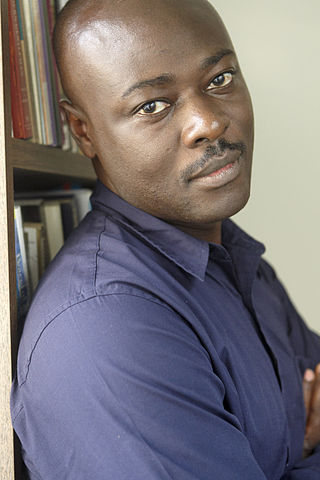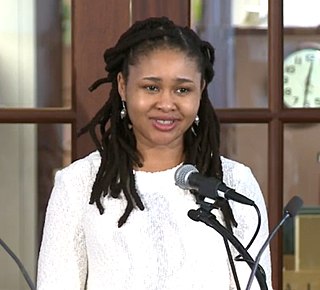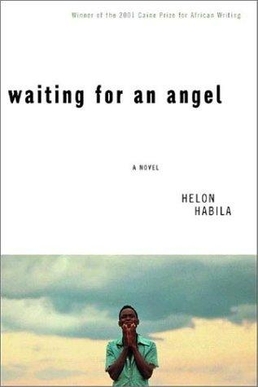
Yvonne Vera was an author from Zimbabwe. Her first published book was a collection of short stories, Why Don't You Carve Other Animals (1992), which was followed by five novels: Nehanda (1993), Without a Name (1994), Under the Tongue (1996), Butterfly Burning (1998), and The Stone Virgins (2002). According to the African Studies Center at University of Leiden, "her novels are known for their poetic prose, difficult subject-matter, and their strong women characters, and are firmly rooted in Zimbabwe's difficult past." For these reasons, she has been widely studied and appreciated by those studying postcolonial African literature.

The Caine Prize for African Writing is an annual literary award for the best short story by an African writer, whether in Africa or elsewhere, published in the English language. Founded in the United Kingdom in 2000, the £10,000 prize was named in memory of businessman and philanthropist Sir Michael Harris Caine, former chairman of Booker Group and of the Booker Prize management committee. The Caine Prize is sometimes called the "African Booker". The Chair of the Board is Ellah Wakatama, appointed in 2019.

Kwani? is a prominent African literary magazine headquartered in Kenya. It has been hailed as "undoubtedly the most influential journal to have emerged from sub-Saharan Africa".

Helon Habila Ngalabak is a Nigerian novelist and poet, whose writing has won many prizes, including the Caine Prize in 2001. He worked as a lecturer and journalist in Nigeria before moving in 2002 to England, where he was a Chevening Scholar at the University of East Anglia, and now teaches creative writing at George Mason University, Fairfax, Virginia.

Adrian Igonibo Barrett is a Nigerian writer of short stories and novels. In 2014, he was named on the Africa39 list of writers aged under 40 with potential and talent to define future trends in African literature. Following his two collections of short stories – From Caves of Rotten Teeth (2005) and Love Is Power, or Something Like That (2013) – his first novel, Blackass, was published in 2015, described by the Chicago Review of Books as "Kafka with a wink".

Monica Arac de Nyeko is a Ugandan writer of short fiction, poetry, and essays, living in Nairobi, Kenya. In 2007, she became the first Ugandan to win the Caine Prize for African Writing, with her story "Jambula Tree". She had previously been shortlisted for the prize in 2004 for "Strange Fruit", a story about child soldiers in Gulu, Northern Uganda. She is a member of FEMRITE – Uganda Women Writers Association and the chief editor of T:AP Voices. She taught literature and English at St. Mary's College Kisubi, before proceeding to pursue a Master's degree in Humanitarian Assistance at the University of Groningen. Her personal essay "In the Stars" won first prize in the Women's World, Women in War Zones essay writing competition. She has been published in Memories of Sun, The Nation, IS magazine, Poetry International and several other publications. She was one of the writers chosen as part of the Africa39 project unveiled by Rainbow, Hay Festival and Bloomsbury Publishing at the London Book Fair 2014, featuring a list of 39 of Sub-Saharan Africa's most promising writers under the age of 40.
Kachifo Limited is an independent publishing house based in Lagos, Nigeria. It was founded in 2004 by Muhtar Bakare. Its imprints include Farafina Books, Farafina Educational, and Prestige Books. From 2004 to 2009, it published the influential Farafina Magazine.

Abdulrazak Gurnah is a Tanzanian-born British novelist and academic. He was born in the Sultanate of Zanzibar and moved to the United Kingdom in the 1960s as a refugee during the Zanzibar Revolution. His novels include Paradise (1994), which was shortlisted for both the Booker and the Whitbread Prize; By the Sea (2001), which was longlisted for the Booker and shortlisted for the Los Angeles Times Book Prize; and Desertion (2005), shortlisted for the Commonwealth Writers' Prize.
Sarah Ladipo Manyika FRSL is a British-Nigerian writer of novels, short stories and essays and an active member of the literary community, particularly supporting and amplifying young writers and female voices. She is the author of two well-received novels, In Dependence (2009) and Like A Mule Bringing Ice Cream To The Sun (2016), as well as the non-fiction collection Between Starshine and Clay: Conversations from the African Diaspora (2022), and her writing has appeared in publications including Granta, Transition, Guernica, and OZY, and previously served as founding Books Editor of OZY. Manyika's work also features in the 2019 anthology New Daughters of Africa, edited by Margaret Busby.

NoViolet Bulawayo is the pen name of Elizabeth Zandile Tshele, a Zimbabwean author. In 2012, the National Book Foundation named her a "5 under 35" honoree. She was named one of the Top 100 most influential Africans by New African magazine in 2014. Her debut novel, We Need New Names, was shortlisted for the 2013 Booker Prize, and her second novel, Glory, was shortlisted for the 2022 Booker Prize, making her "the first Black African woman to appear on the Booker list twice".

The 9mobile Prize for Literature was created by Etisalat Nigeria in 2013, and is the first ever pan-African prize celebrating first-time African writers of published fiction books. Awarded annually, the prize aims to serve as a platform for the discovery of new creative talent out of the continent and invariably promote the burgeoning publishing industry in Africa. The winner receives a cash prize of £15,000 in addition to a fellowship at the University of East Anglia.

Ellah Wakatama, OBE, Hon. FRSL, is the Editor-at-Large at Canongate Books, a senior Research Fellow at Manchester University, and Chair of the AKO Caine Prize for African Writing. She was the founding Publishing Director of the Indigo Press. A London-based editor and critic, she was on the judging panel of the 2017 International Dublin Literary Award and the 2015 Man Booker Prize. In 2016, she was a Visiting Professor & Global Intercultural Scholar at Goshen College, Indiana, and was the Guest Master for the 2016 Gabriel Garcia Marquez Foundation international journalism fellowship in Cartagena, Colombia. The former deputy editor of Granta magazine, she was the senior editor at Jonathan Cape, Random House and an assistant editor at Penguin. She is the series editor of the Kwani? Manuscript Project and the editor of the anthologies Africa39 and Safe House: Explorations in Creative Nonfiction.

Chinelo Okparanta is a Nigerian-American novelist and short-story writer. She was born in Port Harcourt, Nigeria, where she was raised until the age of 10, when she emigrated to the United States with her family.

Oil on Water is a 2010 petrofiction novel by Nigerian author Helon Habila. The novel documents the experience of two journalists as they try to rescue a kidnapped European wife in the oil landscape of the Niger Delta. The novel explores themes of both the ecological and political consequences of oil conflict and petrodollars in the delta.
Novuyo Rosa Tshuma is a Zimbabwe-born writer and professor of creative writing. She is the author of Shadows, a novella, and House of Stone, a novel.

Imachibundu Oluwadara Onuzo is a Nigerian novelist. Her first novel, The Spider King's Daughter, won a Betty Trask Award, was shortlisted for the Dylan Thomas Prize and the Commonwealth Book Prize, and was longlisted for the Desmond Elliott Prize and the Etisalat Prize for Literature.
Yewande Omotoso is a South African-based novelist, architect and designer, who was born in Barbados and grew up in Nigeria. She currently lives in Johannesburg. Her two published novels have earned her considerable attention, including winning the South African Literary Award for First-Time Published Author, being shortlisted for the South African Sunday Times Fiction Prize, the M-Net Literary Awards 2012, and the 2013 Etisalat Prize for Literature, and being longlisted for the 2017 Bailey's Women's Prize for Fiction. She is the daughter of Nigerian writer Kole Omotoso, and the sister of filmmaker Akin Omotoso.

Waiting for an Angel is a 2002 political novel written by Nigeria writer Helon Habila. It was first published by New York's publishing firm W. W. Norton & Company.

Prison Stories, styled as Prison Stories: A Collection of Short Storie[s], is a collection of prison stories by Nigerian writer Helon Habila. "Love Poem", which is among the stories included in the collection, won the 2001 Caine Prize for African Writing. It was first published by Epic Books.

Glory is the second novel of Zimbabwean author NoViolet Bulawayo. Published on 8 March 2022, Glory is a political satire inspired by George Orwell's novel Animal Farm. It was shortlisted for the 2022 Booker Prize, which was announced on 6 September 2022.
















